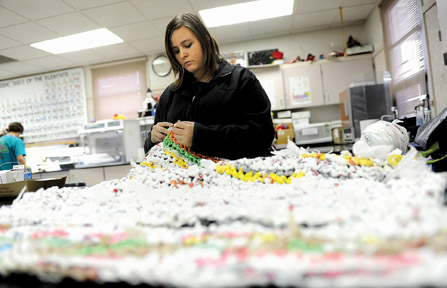
Members of the San Benito High School Outdoor Club and the Knitting and Crochet Club have come up with a clever way to reuse the plastic bags that many people have overflowing in their households after a few trips to the store.
The students have joined forces to turn the plastic shopping bags into three by six foot sleeping pads that will be donated to homeless residents. Their goal is to complete 40 mats by Earth Day on April 22 while highlighting the alternative to plastic bags – using one’s own reusable cloth bags.
Ashlee Marcom, a senior and member of both clubs, and another student got the idea from someone at Marcom’s church, Hillside Christian Fellowship. Marcom said some people involved in the Homeless Coalition attend her church so they helped develop the idea.
“I’ve known how to crochet since I was 7,” she said, working on a row of stitches. “It’s an easy stitch – one of the first ones I was taught.”
Marcom learned to crochet from her great-grandmother.
She suggested the idea to members of both clubs, who have been collecting plastic bags and cutting them into strips. The strips are tied together and then wrapped into a yarn ball to be used by those who know how to crochet.
“I usually spend time on the couch watching TV or talking while doing this,” Marcom said. “It usually consumes my breaks and lunches.”
The Knitting and Crochet club is new to campus this year, though the Outdoor Club has been around for a while.
Teacher Jessica Gautney helped the students form the club when they showed a passion for knitting and crocheting.
Megan Kelley, a senior, said she heard about the club in the bulletin at the beginning of the school year and she knew Gautney
from having her as a teacher.
“I did hats and a little blanket,” Kelley said, of her earlier knitting projects. “I’m pretty moderate but I’ve gotten a lot better.”
Her boyfriend is in college and she knitted a small blanket in his school colors with the word prom on it to ask him to the dance.
For the last few weeks, the students in both clubs have been focused on the plastic bag project. Members of the outdoor club admit that they weren’t sure how it was going to work when Marcom first shared the idea with them.
“It really confused me at first, but then I saw it and understood,” said Leo Shippley, a senior and president of the Outdoor Club. “We are helping people out and reducing the amount of plastic bags that go into the landfills.”
Mia Vodanovich, a senior, said she had no idea how it would work at first but thought it was a cool idea.
“We go out and do clean-ups (of the San Benito River bed) and occasionally we find remnants of homeless communities,” said Jonathan Crowther, a junior in the Outdoor Club. “It makes you think about how they live, and to be able to help is good. It gives use to the plastic bags we throw away all the time.”
The students and teachers said it takes 600 plastic bags to make one of the large sleeping mats.
Teacher Jim Ostdick said the project is also a way for students to highlight the need to move away from using plastic bags for shopping.
“Each Californian uses 500 plastic bags a year so that’s a billion just in California,” he said. “If we just reduce it by half, we would be a lot better off.”
He said plastic bags can be reused, but it is a hard product to recycle.
“Most of them do not go into landfills,” he said. “They get into waterways and the ocean. Animals mistake them for jellyfish.”
Marcom said almost any type of plastic bag will work to make the mats, from the bags typically received at grocery stores or other shopping areas to the plastic bags that people use for produce or even plastic tablecloths that have been wiped clean.
She has enlisted students at Calaveras Elementary School to help collect bags for the project. She is going to go into some of the classrooms to teach the students how to cut the bags into strips to make them into yarn balls.
“They are so enthusiastic,” she said. She has also asked members of her church to donate bags to the cause.
She said they settled on making 40 mats because as the homeless shelter closes for the season the shelter staff said that is around the number of homeless clients they felt would be accepting of the offer. The students selected Earth Day as their deadline to coincide with the message that cloth bags are an alternative to the plastic shopping bags.
“Plastic has a lot of good uses,” Ostdick said. “Shopping bags is not a good use.”
Anyone who would like to donate plastic bags to the project can email Jim Ostdick at ji*********@***il.com.









